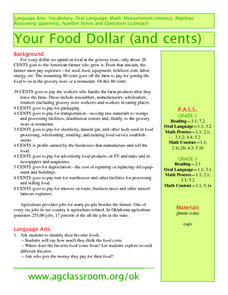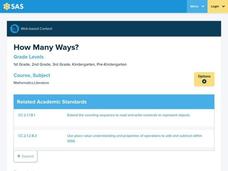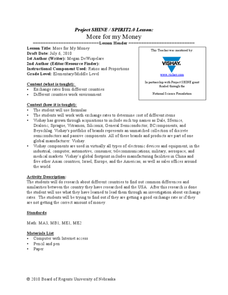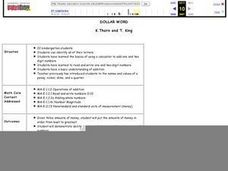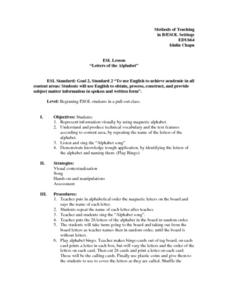Curated OER
Your Food Dollar (and Cents)
Young scholars examine where their food dollars go while recognizing coins and making change. They identify their favorite foods, receive one dollar, and take away amounts for each person involved in the production of their food dollar.
Curated OER
If I Had A Million Dollars
Students write a persuasive letter. In this philanthropy lesson, students write about what they would do if they had a million dollars. They discuss worthwhile community causes they could donate money to. Students also research...
Curated OER
Bright Ideas for Bringing up Smart Savers
Young scholars explore the concept of saving money. In this saving money instructional activity, students read an article about saving money. Young scholars discuss ways to save money and what makes it difficult to save money. Students...
Curated OER
Taxes: Where Does Your Money Go?
High schoolers explore the concept of taxes. In this tax lesson plan, students investigate types of taxes and deductions taken out of a paycheck before they see it. High schoolers calculate the tax on a given dollar amount. Students...
Curated OER
Where did the too many dollars come from?
Students experience demand-pull inflation while gaining insight into three major sources of the '''too many dollars" which chase after the "too few goods and services. Students participate in an auction to experience inflation firsthand.
Pennsylvania Department of Education
How Many Ways?
Students estimate the amount of money they have in groups of pennies, nickels, and dimes. In this money lesson plan, students then count up the amounts they have and exchange money amounts.
Curated OER
Ponzi? An April Fool's Day History and Economics Lesson Plan
Students explore the concept of a Ponzi Scheme. In this economics lesson, students invest in a product called Thin-Cups. Students invest money in this product over the course of a couple weeks. Students discover how a Ponzi Scheme works...
Curated OER
Five Dollars
Sixth graders catch and throw balls at all levels high, medium, and low while counting their points up from the balls that they catch. They are asked the skills that they have already explored in softball from the previous class. ...
Curated OER
How Can Big Business Make Money From Tariffs?
Students explore the concept of the rise of big business in the United States. In this economics instructional activity, students investigate the impact of tariffs on businesses. Students also investigate the impact that incentives have...
Curated OER
Place Value Lesson
Fourth graders use place value structure to construct and compare numbers that are up to the ten thousands. In this place value lesson plan, 4th graders explain and discuss numbers that are greatest in size according to the place of the...
Curated OER
No Food, No Money, No Job: What to Do?
Learners explore the concept of philanthropy. In this service learning lesson, students research the Civilian Conservation Corps and create an advertisement that might have promoted it.
Curated OER
More for my Money
Learners solve problems involving ratio and proportion. In this algebra lesson, students analyze the currencies found in different countries. They create formulas to convert between the different currencies and use ratio and proportion...
Curated OER
Mount Everest History Lesson
Students explore Mount Everest. In this exploration lesson, students read "The Top of the World: Climbing Mount Everest," by Steve Jenkins. Students then respond to discussion questions and participate in a map skills activity.
Curated OER
Investing: Reflect? Lesson 7
Learners explore the concept of investing. In this investment lesson plan, students discuss the best way to invest money. Learners then write essays, taking two seperate points of view.
Curated OER
Looking at Labor
Students explore reasons why some jobs are more respected than others. In this jobs lesson plan, students are split into teams and discuss why some jobs are more respected, and are better paid than other jobs in society.
Curated OER
Introduction To Markets - Lesson Plan: 1 X 1 Hour Lesson
Students study the concept of a market. They determine the different purposes of buyers and sellers. They look at the utility of an item and how the value for money affects the decision making of consumers.
Curated OER
Farmworkers and the Union: A Lesson from Viva La Causa
Students examine the role of labor unions. In this labor union lesson, students watch "Viva la Causa" and discuss the working conditions that led farm workers to strike. Students also read a handout regarding labor unions and share their...
Curated OER
Stitching Truth Lesson One: What is Civil Society?
Ninth graders create a working definition of civil society. In this US History lesson, 9th graders create a list of terms that help make up the term civil society. Students examine the case study of life in Pinochet's Chile.
Curated OER
Discovering Math Concepts in Business Mathematics, Economics, and Finance
Explore the concept of money and research its origin. There are many concepts related to business math, thusly, there are many formulas used to make calculations around money. Exchange rates of money in different countries, interest,...
Curated OER
Dollar Word
Students review the value of coins prior to adding up values to equal one dollar. Letters of the alphabet are assigned monetary values and students use calculators to add up the value of a word. Students work with a partner to try and...
Visa
A Way to Wealth: Understanding Interest and Investments
Money motivates! Help young bankers understand how math plays a part in investing. Give learners math practice while instilling real-world financial literacy skills.
Curated OER
Consumer Borrowing and Spending
Credit can be confusing for teens, some of whom are already using credit cards. Clear up misconceptions with this group research activity which has a solid outline with a lot of room to adjust to your needs and resources. Groups are...
Curated OER
Basic Needs of Living Things - Lesson One
An interesting way of teaching about basic needs of different organisms awaits your fourth graders. Pupils take part in class discussions and demonstrations which should lead to a greater understanding of how to determine basic needs. As...
Curated OER
ESL Lesson - Letters of the Alphabet
Students visually represent information by using magnetic letters of the alphabet and understand and use technical vocabulary. They are able to repeat the name of the letters and sing the "Alphabet Song". They show what they have learned...
Other popular searches
- Money Lessons Giving Change
- Counting Money Lessons
- Canadian Money Lessons
- Second Grade Money Lessons
- 2nd Grade Money Lessons
- Australian Money Lessons
- Shopping Money Lessons
- Math Money Lessons
- Money Lessons Elementary
- Fun Money Lessons
- Counting Money Math Lessons
- Adding Money Amounts Lessons


